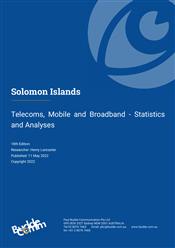Solomon Islands Telecoms Market Report
Telecoms, Mobile and Broadband - Statistics and Analyses

Coral Sea Cable System alleviates international bandwidth constraints
Mobile services have continually expanded in the Solomon Islands. 3G services became available in 2010, leading to an increase in mobile broadband uptake. Solomon Islands currently host three ISPs: Solomon Telekom, Bmobile and SATSOL. Fixed broadband services which underpin the development of a digital economy are largely limited to government, corporations, and educational organisations in the Solomon Islands.
Telecommunication infrastructure in the Solomon Islands requires significant investment due to the geographical make-up of the islands. This presents a great challenge to rural connectivity in the country. Although various international organisations such as the World Bank and the Asian Development Bank have taken a special interest in having communication services improved in both the Solomon Islands and the Pacific region in general, internet and broadband penetration remain low. The provision of broadband infrastructure, particularly to rural areas, is also hindered by land disputes.
Internet services have, however, improved with the build-out of the Coral Sea Cable System linking Papua New Guinea to the Solomon Islands, as also with a connecting cable to a landing station at Sydney. The Australian government provided most of the funding for the Coral Sea Cable System, with contributions and support from the Solomon Islands and Papua New Guinea governments.
The launch of the Kacific-1 satellite in late 2019 also improved broadband satellite capacity for the region, though for telcos in Solomon Islands satellite services are now largely used as backup for international traffic.
In recent years, the country has stabilised both politically and economically and this, along with improvements to mobile infrastructure, has led to a rise in mobile penetration and the slow uptake of broadband services. While the first LTE services were launched in late 2017 in the capital Honiara, the main platform for mobile voice and data services remains 3G, while in outlying areas GSM is still an important technology for the provision of services.
Geopolitical concerns have also come to the fore as the government pursues stronger ties with China. This is a growing source of tension with Australia, which is the Solomon Islands’ largest aid donor. In April 2022, the country signed a security agreement with China, although the full details of the agreement have not been published.
BuddeComm notes that the outbreak of the pandemic had a significant impact on production and supply chains globally. However, the telecoms sector, has benefited from a rebound in mobile device production during 2021.
On the consumer side, spending on telecoms services and devices is under pressure from the financial effect of large-scale job losses and the consequent restriction on disposable incomes. However, the crucial nature of telecom services, both for general communication as well as a tool for home-working, has offset such pressures. The market is thus expected to continue a positive growth trajectory through 2022.
Key developments:
- Coral Sea Cable System and Kacific-1 helping to alleviate international bandwidth constraints, focus shifts to improving last mile connectivity;
- Our Telekom plans large scale network upgrade;
- Government signs a SBD37.6 million funding agreement with Australia to build additional telecom towers;
- Bmobile enters into an agreement with Lynk Global to provide satellite mobile services;
- Bills and Legislation Committee presents inquiry into the Telecommunications (Amendment) Bill 2021, to address SIM card registration requirements;
- Growth in mobile data consumption driven by high proportion of consumers under the age of 25;
- Report update includes the regulator’s market data report for 2020, recent market developments.
Companies covered in this report include:
Our Telekom (Breeze); Bmobile-Vodafone; Kacific Broadband Satellite, O3b, Interchange Limited, Solomon Island Submarine Cable Company.
Related Reports
- South Pacific Islands - Telecoms, Mobile and Broadband - Statistics and Analyses
- Samoa - Telecoms, Mobile and Broadband - Statistics and Analyses
- New Caledonia - Telecoms, Mobile and Broadband - Statistics and Analyses
- Fiji - Telecoms, Mobile and Broadband - Statistics and Analyses
- Papua New Guinea - Telecoms, Mobile and Broadband - Statistics and Analyses
- Vanuatu - Telecoms, Mobile and Broadband - Statistics and Analyses
- French Polynesia - Telecoms, Mobile and Broadband - Statistics and Analyses
- Australia - Telecoms, Mobile and Broadband - Statistics and Analyses
Share this Report
TMT Intelligence
A platform to scale your intelligence tasks
Monitor critical insights with our AI-powered Market Intelligence Platform gathering and analyzing intelligence in real time. With AI trained to spot emerging trends and detect new strategic opportunities, our clients use TMT Intelligence to accelerate their growth.
If you want to know more about it, please see:
Research Methodology
BuddeComm's strategic business reports contain a combination of both primary and secondary research statistics, analyses written by our senior analysts supported by a network of experts, industry contacts and researchers from around the world as well as our own scenario forecasts.
For more details, please see:
More than 4,000 customers from 140 countries utilise BuddeComm Research
Are you interested in BuddeComm's Custom Research Service?
Hot Topics
News & Views
Have the latest telecommunications industry news delivered to your inbox by subscribing to BuddeComm's weekly newsletter.